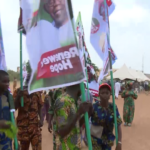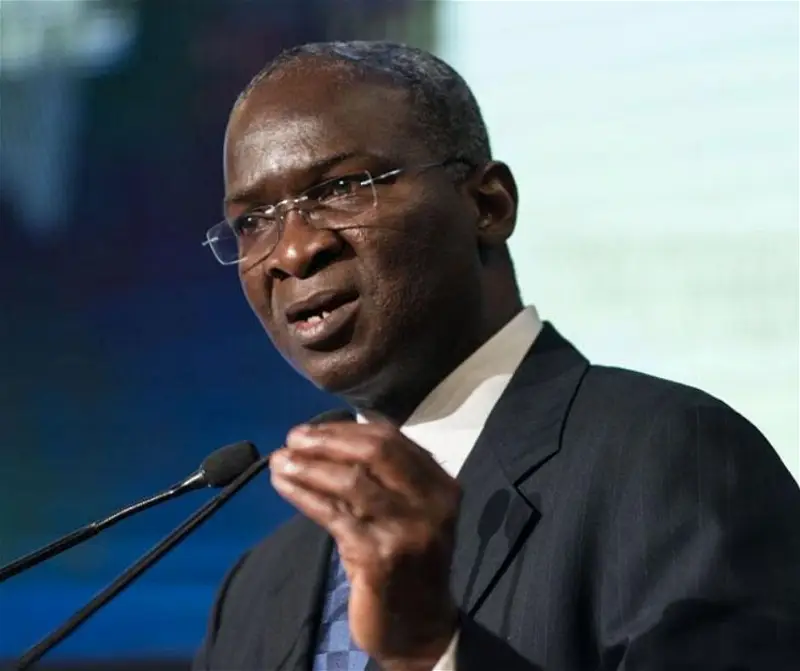TUNJI OLANIYI
Minister of Power, Works and Housing, Babatunde Raji Fashola, SAN, has said that as part of efforts to increase power supply, by the end of this year another 945 megawatts (MW) would be ready for supply from four power plants in the country.
The Minister stated this in Lagos while delivering a paper on “The True Situation Of Electric Power In Nigeria Today And The Prospects For The Future” at the Nigeria-South Africa Chamber Of Commerce (NSACC) October 2018 Breakfast Forum, Eko Hotel Lagos.
According to Fashola, the power plants from where the another 945 MW will be supplied are : Azura 450MW (which is finished and producing); AFAM IV 240MW (which is finished and awaiting commissioning) ; Kaduna ,215MW (which is undergoing pre-commissioning testing) and Kashimbilla, 40MW (which is nearing completion).
“Between 2019 and 2020 (Q1) Zungeru700MW, Okpai II 450MW, totaling 1,150MW should come into operation. These do not include about 7,000MW of installed but inoperative power plants that are constrained either by Gas supply or transmission capacity or both, about which action is being taken.
“ It does not include independent power plants now under construction in nine federal universities with a plan to scale to 37, neither does it include 15 independent power projects targeting major markets now under construction to power 85,000 shops and small businesses”, Fashola further said.
On the transmission side, the Minister said apart from finalizing a 10-year transmission expansion plan from 2018 to 2028, “we have recovered 690 containers of power equipment abandoned at the Port as part of the legacy of the previous 16 years, and deployed them to the sub-stations they were originally meant for”.
He added that presently, there are not less than 90 transmission sub-station projects at different stages of construction, stating that this year, while a few have been completed, others including Damaturu sub-station in Yobe and Ejigbo sub-station have been commissioned.
He said so also will be the Ilase tourist beach in Lagos, which will soon be connected to grid power for the first time in its history.
On the distribution side, Fashola, who reminded the people that of all the 11 companies that distribute power were sold to private investors, said it was their responsibility not that of Government to supply distribution equipment like breakers, transformers and meters.
‘So, if there is any problem there, as indeed there are, it is private businessmen who should solve this problem”, he stated.
Speaking further , the Minister said: “Of course, their ability to respond partly depends on what government does. So, to the question what is government doing? I say: We have 7,000 MW of power operationally available but distribution can only take 5,000.
We have engaged with Manufacturers Association of Nigeria (MAN) to offer the rights to take the 2,000MW and enunciated the Eligible Customer Policy for consumers who take up to 2MW and beyond.
“ The policy took effect recently, 5 major industries have connected and we have dozens of new applications being processed;
“b. For meter shortages, we have enunciated a policy of licencing Meter Asset Providers, independent of the Discos but who will be supplying their customers. 180 applications have been received.
“Discos are also investing in meters and supplying them.
“c) Off-grid supply – we have enunciated a Mini Grid Regulation that allows people to build and distribute up to 1MW under licence, and up to 100kw without licence.
“d) Distribution Expansion- In order to support distribution equipment capacity, government as a shareholder of the Discos is investing about N72B in distribution equipment at the 33kv and 11kv points of the value chain.
“In summary, incremental capacity is heading in the right direction, we are planning to solve today’s problems, liberalize participation in the sector, and enable private sector undertake the business of generating and distributing power, which it contracted to do with the privatization programme that took place in 2013.
“The prospects for the future are clear, they portray hope, and I am optimistic that today’s problems represent opportunities in the power sector for tomorrow’.









